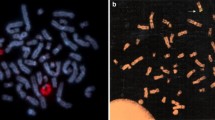Summary
Three years ago, we detected H-Y antigen in the white blood cells of a phenotypic female with several of the stigmata of Turner's syndrome, and the mosaic karyotype: 45,X/46,X,i(Xq). We surmised at the time that the isochromosome, i(Xq), may have contained occult Y-chromosome-derived material. We have now confirmed the presence of H-Y in this patient and we have obtained evidence for the presence of H-Y in four of five other similar patients, all of whom are notable for carrying at least a single cell line with the karyotype 46,X,i(Xq). Although we cannot categorically exclude the presence of Y-chromosomal genes in the cells of these patients, there is no cytogenetic evidence of structural rearrangement involving the Y in any of the cases. Expression of H-Y antigen in association with i(Xq) thus implies that H-Y structural genes are X-situated, or alternatively that they are autosomal and X-regulated. It would follow that the H-Y+ cellular phenotype per se is not a valid marker for the Y-chromosome, and that H-Y genes that have been mapped to the pericentric region of the Y may be regulatory.
Similar content being viewed by others
References
Bernstein R, Koo GC, Wachtel SS (1980) Abnormality of the X chromosome in human 46,XY female siblings with dysgenetic ovaries. Science 207:768–769
Breg WR, Genel M, Koo GC, Wachtel SS, Krupen-Brown K, Miller OJ (1979) H-Y antigen and human sex chromosomal abnormalities. In: Vallet HL, Porter IH (eds) Genetic mechanisms of sexual development. Academic Press, New York, p 279
Chapelle A de la, Koo GC, Wachtel SS (1978) Recessive sex-determining genes in human XX male syndrome. Cell 15: 837–842
Fellous M, Gunther E, Kemler R, Wiels J, Berger R, Guenet JL, Jakob H, Jacob F (1978) Association of the H-Y male antigen with β2 on human lymphoid and differentiated mouse teratocarcinoma cell lines. J Exp Med 147:58–70
German J, Simpson JL, Chaganti RSK, Summitt RL, Reid LB, Merkatz IR (1978) Genetically determined sex-reversal in 46,XY humans. Science 202:53–56
Goldberg EH, Boyse EA, Bennett D, Scheid M, Carswell EA (1971) Serological demonstration of H-Y (male) antigen on mouse sperm. Nature 232:478–480
Hall JL, Wachtel SS (to be published) Primary sex determination: genetics and biochemistry. Mol Cell Biochem
Hamerton JL, Dickson JM, Pollard CE, Griees SA, Short RV (1969) Genetic intersexuality in goats. J Reprod Fertil (Suppl 7):25–51
Haseltine FP, Breg WR, Koo GC, Wachtel SS, Genel M (1980) H-Y antigen expression in subjects with Turner's phenotype and i(Xq). Abstract presented at Annual Meeting: Society for Gynecologic Investigation, Denver
Iwata H, Nagai Y, Stapleton DD, Smith RC, Ohno S (1979) Identification of human H-Y antigen and its testis-organizing function. Arthritis Rheum 22:1211–1216
Koo GC, Boyse EA, Wachtel SS (1977a) Immunogenetic techniques and approachs in the study of sperm and testicular cell surface antigens. In: Edidin M, Johnson MH (eds) Immunobiology of gametes. Alden Press, Oxford, p 73
Koo GC, Wachtel SS, Krupen-Brown K, Mittl LR, Breg WR, Genel M, Rosenthal IM, Borgaonkar DS, Miller DA, Tantravahi R, Schreck RR, Erlanger BF, Miller OJ (1977b) Mapping the locus of the H-Y gene on the human Y chromosome. Science 198:940–942
Nagai Y, Ciccarese S, Ohno S (1979) The identification of human H-Y antigen and testicular transformation induced by its interaction with the receptor site of bovine fetal ovarian cells. Differentiation 13:155–164
Ohno S (1967) Sex chromosomes and sex-linked genes. Springer, New York
Ohno S, Nagai Y, Ciccarese S, Iwata H (1979) Testis-organizing H-Y antigen and the primary sex-determining mechanism of mammals. Recent Prog Horm Res 35:449–470
Rosenfeld RG, Luzzatti L, Hintz RL, Miller OJ, Koo GC, Wachtel SS (1979) Sexual and somatic determinants of the human Y-chromosome: studies in a 46,XYp-phenotypic female. Am J Med Genet 31:458–468
Selden JR, Wachtel SS, Koo GC, Haskins ME, Patterson DF (1978) Genetic basis of XX male syndrome and XX true hermaphroditism: evidence in the dog. Science 201:644–646
Simpson JL (1975) Gonadal dysgenesis and abnormalities of the human sex chromosomes: current status of phenotypic-karyotypic correlations. Birth Defects 11:23–59
Simpson JL (1976) Disorders of sexual differentiation. Etiology and clinical delineation. Academic Press, New York
Wachtel SS (1979) H-Y antigen in the mammalian female. Ann Biol Anim Biochim Biophys 19:1231–1237
Wachtel SS, Koo GC, Breg WR, Thaler HT, Dillard GM, Rosenthal IM, Dosik H, Gerald PS, Saenger P, New M, Lieber E, Miller OJ (1976) Serologic detection of a Y-linked gene in XX males and XX true hermaphrodites. N Engl J Med 295: 750–754
Wolf U (1979) XY gonadal dysgenesis and the H-Y antigen. Hum Genet 47:269–277
Wolf U, Fraccaro M, Mayerova A, Hecht T, Maraschio P, Hameister H (1980a) A gene controlling H-Y antigen on the X chromosome. Tentative assignment by deletion mapping to Xp223. Hum Genet 54:149–154
Wolf U, Fraccaro M, Mayerova A, Hecht T, Zuffardi O, Hameister H (1980b) Turner syndrome patients are H-Y positive. Hum Genet 54:315–318
Author information
Authors and Affiliations
Rights and permissions
About this article
Cite this article
Wachtel, S.S., Koo, G.C., Breg, W.R. et al. H-Y antigen in X,i(Xq) gonadal dysgenesis: Evidence of X-linked genes in testicular differentiation. Hum Genet 56, 183–187 (1980). https://doi.org/10.1007/BF00295692
Received:
Revised:
Issue Date:
DOI: https://doi.org/10.1007/BF00295692




